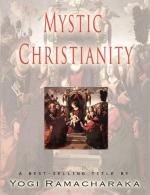even of the princes of this world know’—a
statement which could not by any possibility have
been truthfully made if he had been referring merely
to ordinary Christian teaching which is openly
preached before all men. His immediate followers,
the Fathers of the Church, knew perfectly well
what he meant, for they all use precisely the
same phraseology. Clement of Alexandria, one
of the earliest and greatest of all, tells us
that ’It is not lawful to reveal to the
profane persons the Mysteries of the Word.’”
“Another consideration shows us clearly how much of this early teaching has been lost. The church now devotes herself solely to producing good men, and points to the saint as her crowning glory and achievement. But in older days she claimed to be able to do much more than that. When she had made a man a saint, her work with him was only just beginning, for then only was he fit for the training and teaching which she could give him then, but cannot now, because she has forgotten her ancient knowledge. Then she had three definite stages in her course of training—Purification, Illumination and Perfection. Now she contents herself with the preliminary Purification, and has no Illumination to give.”
“Read what Clement says: ’Purity is only a negative state, valuable chiefly as the condition of insight. He who has been purified in Baptism and then initiated into the Little Mysteries (has acquired, that is to say, the habits of self-control and reflection) becomes rife for the Greater Mysteries for the Gnosis, the scientific knowledge of God.’ In another place he says: ’Knowledge is more than faith. Faith is a summary knowledge of urgent truths, suitable for people who are in a hurry; but knowledge is scientific faith.’ And his pupil Origen writes of ’the popular, irrational faith’ which leads to what he calls physical Christianity, based upon the gospel history, as opposed to the spiritual Christianity conferred by the Gnosis of Wisdom. Speaking of teaching founded upon historical narrative, he says, ’What better method could be devised to assist the masses?’ But for those who are wise he has always the higher teachings, which are given only to those who have proved themselves worthy of it. This teaching is not lost; the church cast it out when she expelled the great Gnostic Doctors, but it has nevertheless been preserved, and it is precisely that Wisdom which we are studying—precisely that which we find to answer all the problems of life, to give us a rational rule by which to live, to be to us a veritable gospel of good news from on high.”
St. Paul indicates the existence of the Secret Doctrine of Christianity, when he says to the Corinthians:
“And I, brethren, could not speak unto you as unto spiritual, but as unto carnal, as unto babes in Christ. I fed you with milk, not with meat; for ye were not yet able to bear it; nay, not even now are ye able, for ye are yet carnal.” (I Cor. 3:1.)
Jesus said: “Give not that which is holy unto the dogs, neither cast your pearls before the swine, lest haply they trample them under their feet, and turn and rend you.” (Matt. 7:6.)




